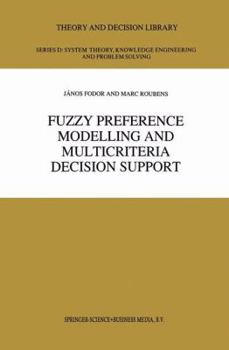Fuzzy Preference Modelling and Multicriteria Decision Support
The encounter, in the late seventies, between the theory of triangular norms, issuing frorn stochastic geornetry, especially the works of Menger, Schweizer and Sklar, on the one band, and the theory of fuzzy sets due to Zadeh, 10n the other band has been very fruitful. Triangular norms have proved to be ready-rnade mathematical rnodels of fuzzy set intersections and have shed light on the algebraic foundations of fuzzy sets. One basic idea behind the study of triangular norms is to solve functional equations that stern frorn prescribed axioms describing algebraic properties such as associativity. Alternative operations such as rneans have been characterized in a similar way by Kolmogorov, for instance, and the rnethods for solving functional equations are now weil established thanks to the efforts of Aczel, among others. One can say without overstaternent that the introduction of triangular norms in fuzzy sets has strongly influenced further developrnents in fuzzy set theory, and has significantly contributed to its better acceptance in pure and applied rnathematics circles. The book by Fodor and Roubens systematically exploits the benefits of this encounter in the- analysis of fuzzy relations. The authors apply functional equation rnethods to notions such as equivalence relations, and various kinds of orderings, for the purpose of preference rnodelling. Centtal to this book is the rnultivalued extension of the well-known result claiming that any relation expressing weak preference can be separated into three cornponents respectively describing strict preference, indifference and incomparability.
Format:Hardcover
Language:English
ISBN:0792331168
ISBN13:9780792331162
Release Date:October 1994
Publisher:Springer
Length:256 Pages
Weight:1.27 lbs.
Dimensions:0.8" x 6.5" x 9.5"
Customer Reviews
0 rating





